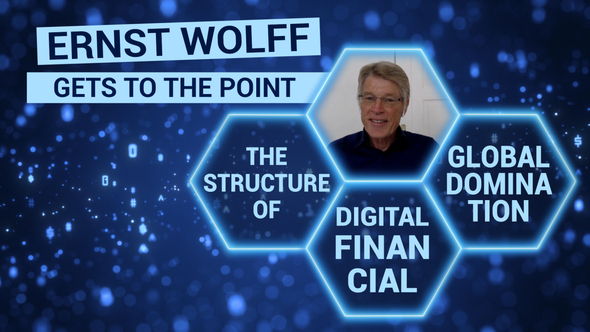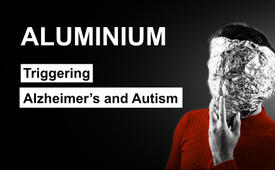All videos (English)
Ernst Wolff gets to the point: The structure of digital-financial global ...
23.08.2022
Subtitle "Afrikaans" was produced by machine.Subtitle "አማርኛ" was produced by machine.Subtitle "العربية " was produced by machine.Subtitle "Ārāmāyâ" was produced by machine.Subtitle "azərbaycan dili " was produced by machine.Subtitle "беларуская мова " was produced by machine.Подзаглавието "България" е създадено от машина.Subtitle "বাংলা " was produced by machine.Subtitle "བོད་ཡིག" was produced by machine.Subtitle "босански" was produced by machine.Subtitle "català" was produced by machine.Subtitle "Cebuano" was produced by machine.Subtitle "ગુજરાતી" was produced by machine.Subtitle "corsu" was produced by machine.Podtitul "Čeština" byl vytvořen automaticky.Subtitle "Cymraeg" was produced by machine.Subtitle "Dansk" was produced by machine.Untertitel "Deutsch" wurde maschinell erzeugt.Subtitle "Untertitel" was produced by machine.Subtitle "Ελληνικά" was produced by machine.Subtitle "English" was produced by machine.Subtitle "Esperanto" was produced by machine.El subtítulo "Español" se generó automáticamente.Subtitle "Eesti" was produced by machine.Subtitle "euskara" was produced by machine.Subtitle "فارسی" was produced by machine.Subtitle "Suomi" was produced by machine.Le sous-titrage "Français" a été généré automatiquement.Subtitle "Frysk" was produced by machine.Subtitle "Gaeilge" was produced by machine.Subtitle "Gàidhlig" was produced by machine.Subtitle "Galego" was produced by machine.Subtitle "Schwizerdütsch" was produced by machine.Subtitle "هَوُسَ" was produced by machine.Subtitle "Ōlelo Hawaiʻi" was produced by machine.Subtitle "עברית" was produced by machine.Subtitle "हिन्दी" was produced by machine.Subtitle "Mẹo" was produced by machine.Subtitle "Hrvatski" was produced by machine.Subtitle "Kreyòl ayisyen " was produced by machine.Subtitle "Magyar" was produced by machine.Subtitle "Հայերեն" was produced by machine.Subtitle "Bahasa Indonesia " was produced by machine.Subtitle "Asụsụ Igbo " was produced by machine.Textun"Íslenska" var framkvæmt vélrænt.Sottotitoli "Italiano" sono stati generati automaticamente.字幕は"日本語" 自動的に生成されました。Subtitle "Basa Jawa" was produced by machine.Subtitle "ქართული" was produced by machine.Subtitle "қазақ тілі " was produced by machine.Subtitle "ភាសាខ្មែរ" was produced by machine.Subtitle "ಕನ್ನಡ" was produced by machine.Subtitle "한국어" was produced by machine.Subtitle "कोंकणी語" was produced by machine.Subtitle "کوردی" was produced by machine.Subtitle "Кыргызча" was produced by machine.Subtitle " lingua latina" was produced by machine.Subtitle "Lëtzebuergesch" was produced by machine.Subtitle "Lingala" was produced by machine.Subtitle "ພາສາ" was produced by machine.Subtitle "Lietuvių" was produced by machine.Subtitle "Latviešu" was produced by machine.Subtitle "fiteny malagasy" was produced by machine.Subtitle "te reo Māori" was produced by machine.Subtitle "македонски јазик" was produced by machine.Subtitle "malayāḷaṁ" was produced by machine.Subtitle "Монгол хэл" was produced by machine.Subtitle "मराठी" was produced by machine.Subtitle "Bahasa Malaysia" was produced by machine.Subtitle "Malti" was produced by machine.Subtitle "မြန်မာစာ " was produced by machine.Subtitle "नेपाली" was produced by machine.Subtitle "Nederlands" was produced by machine.Subtitle "Norsk" was produced by machine.Subtitle "chiCheŵa" was produced by machine.Subtitle "ਪੰਜਾਬੀ" was produced by machine.Subtitle "Polska" was produced by machine.Subtitle "پښتو" was produced by machine.Subtitle "Português" was produced by machine.Subtitle "Română" was produced by machine.Subtitle "Язык жестов (Русский)" was produced by machine.Субтитры "Pусский" были созданы машиной.Subtitle "Kinyarwanda" was produced by machine.Subtitle "सिन्धी" was produced by machine.Subtitle "Deutschschweizer Gebärdensprache" was produced by machine.Subtitle "සිංහල" was produced by machine.Subtitle "Slovensky" was produced by machine.Subtitle "Slovenski" was produced by machine.Subtitle "gagana fa'a Samoa" was produced by machine.Subtitle "chiShona" was produced by machine.Subtitle "Soomaaliga" was produced by machine.Subtitle "Shqip" was produced by machine.Subtitle "србски" was produced by machine.Subtitle "Sesotho" was produced by machine.Subtitle "Basa Sunda" was produced by machine.Undertext "Svenska" är maskinell skapad.Subtitle "Kiswahili" was produced by machine.Subtitle "தமிழ்" was produced by machine.Subtitle "తెలుగు" was produced by machine.Subtitle "Тоҷикй" was produced by machine.Subtitle "ภาษาไทย" was produced by machine.Subtitle "ትግርኛ" was produced by machine.Subtitle "Türkmençe" was produced by machine.Subtitle "Tagalog" ay nabuo sa pamamagitan ng makina.Subtitle "Türkçe" was produced by machine.Subtitle "татар теле" was produced by machine.Subtitle "Українська " was produced by machine.Subtitle "اردو" was produced by machine.Subtitle "Oʻzbek" was produced by machine.Subtitle "Tiếng Việt" was produced by machine.Subtitle "Serbšćina" was produced by machine.Subtitle "isiXhosa" was produced by machine.Subtitle "ייִדיש" was produced by machine.Subtitle "Yorùbá" was produced by machine.Subtitle "中文" was produced by machine.Subtitle "isiZulu" was produced by machine.
kla.TV accepts no liability for defective translation.kla.TV accepts no liability for defective translation.kla.TV accepts no liability for defective translation.kla.TV accepts no liability for defective translation.kla.TV accepts no liability for defective translation.kla.TV accepts no liability for defective translation.kla.TV не носи отговорност за некачествен превод.kla.TV accepts no liability for defective translation.kla.TV accepts no liability for defective translation.kla.TV accepts no liability for defective translation.kla.TV accepts no liability for defective translation.kla.TV accepts no liability for defective translation.kla.TV accepts no liability for defective translation.kla.TV accepts no liability for defective translation.kla.TV nenese žádnou odpovědnost za chybné překlady.kla.TV accepts no liability for defective translation.kla.TV accepts no liability for defective translation.kla.TV übernimmt keine Haftung für mangelhafte Übersetzung.kla.TV accepts no liability for inadequate translationkla.TV accepts no liability for defective translation.kla.TV accepts no liability for defective translation.kla.TV accepts no liability for defective translation.kla.TV no se hace responsable de traducciones incorrectas.kla.TV accepts no liability for defective translation.kla.TV accepts no liability for defective translation.kla.TV accepts no liability for defective translation.kla.TV accepts no liability for defective translation.kla.TV n'assume aucune responsabilité en cas de mauvaise traduction.kla.TV accepts no liability for defective translation.kla.TV accepts no liability for defective translation.kla.TV accepts no liability for defective translation.kla.TV accepts no liability for defective translation.kla.TV accepts no liability for defective translation.kla.TV accepts no liability for defective translation.kla.TV accepts no liability for defective translation.kla.TV accepts no liability for defective translation.kla.TV accepts no liability for defective translation.kla.TV accepts no liability for defective translation.kla.TV accepts no liability for defective translation.kla.TV accepts no liability for defective translation.kla.TV nem vállal felelősséget a hibás fordításértkla.TV accepts no liability for defective translation.kla.TV accepts no liability for defective translation.kla.TV accepts no liability for defective translation.kla.TV tekur enga ábyrgð á áræðanleika þýðingarinnarKla.TV non si assume alcuna responsabilità per traduzioni lacunose e/o errate.Kla.TV は、不適切な翻訳に対して一切の責任を負いません。kla.TV accepts no liability for defective translation.kla.TV accepts no liability for defective translation.kla.TV accepts no liability for defective translation.kla.TV accepts no liability for defective translation.kla.TV accepts no liability for defective translation.kla.TV accepts no liability for defective translation.kla.TV accepts no liability for defective translation.kla.TV accepts no liability for defective translation.kla.TV accepts no liability for defective translation.kla.TV accepts no liability for defective translation.kla.TV accepts no liability for defective translation.kla.TV accepts no liability for defective translation.kla.TV accepts no liability for defective translation.kla.TV accepts no liability for defective translation.kla.TV accepts no liability for defective translation.kla.TV accepts no liability for defective translation.kla.TV accepts no liability for defective translation.kla.TV accepts no liability for defective translation.kla.TV accepts no liability for defective translation.kla.TV accepts no liability for defective translation.kla.TV accepts no liability for defective translation.kla.TV accepts no liability for defective translation.kla.TV accepts no liability for defective translation.kla.TV accepts no liability for defective translation.kla.TV accepts no liability for defective translation.kla.TV accepts no liability for defective translation.kla.TV accepts no liability for defective translation.kla.TV accepts no liability for defective translation.kla.TV accepts no liability for defective translation.kla.TV accepts no liability for defective translation.kla.TV accepts no liability for defective translation.kla.TV accepts no liability for defective translation.kla.TV accepts no liability for defective translation.kla.TV accepts no liability for defective translation.kla.TV не несет ответственности за некачественный перевод.kla.TV accepts no liability for defective translation.kla.TV accepts no liability for defective translation.kla.TV accepts no liability for defective translation.kla.TV accepts no liability for defective translation.kla.TV accepts no liability for defective translation.kla.TV accepts no liability for defective translation.kla.TV accepts no liability for defective translation.kla.TV accepts no liability for defective translation.kla.TV accepts no liability for defective translation.kla.TV accepts no liability for defective translation.kla.TV accepts no liability for defective translation.kla.TV accepts no liability for defective translation.kla.TV accepts no liability for defective translation.Kla.TV tar inget ansvar för felaktiga översättningar.kla.TV accepts no liability for defective translation.kla.TV accepts no liability for defective translation.kla.TV accepts no liability for defective translation.kla.TV accepts no liability for defective translation.kla.TV accepts no liability for defective translation.kla.TV accepts no liability for defective translation.kla.TV accepts no liability for defective translation.kla. Walang pananagutan ang TV sa mga depektibong pagsasalin.kla.TV accepts no liability for defective translation.kla.TV accepts no liability for defective translation.kla.TV accepts no liability for defective translation.kla.TV accepts no liability for defective translation.kla.TV accepts no liability for defective translation.kla.TV accepts no liability for defective translation.kla.TV accepts no liability for defective translation.kla.TV accepts no liability for defective translation.kla.TV accepts no liability for defective translation.kla.TV accepts no liability for defective translation.kla.TV accepts no liability for defective translation.kla.TV accepts no liability for defective translation.
This is a modal window.
The media could not be loaded, either because the server or network failed or because the format is not supported.
Ernst Wolff gets to the point: The structure of digital-financial global domination (Interview with Ernst Wolff)
Ernst Wolff explains in a generally understandable way the background and mechanisms of the digital financial complex, how the roles are distributed and who passes the ball to whom in order to further expand an unprecedented global-centralist domination.
[continue reading]
Ernst Wolff gets to the point: The structure of digital-financial global domination (Interview with Ernst Wolff)
Download broadcast and attachments in the wanted quality:
Useage rights:
Standard-Kla.TV-Licence
Trending on Kla.TV





















23.08.2022 | www.kla.tv/23417
Interviewer: Mr. Wolff, in one of your latest interviews with Kla.TV you gave your assessment of the background of the Ukraine war and the Covid-19 crisis. In your view, these crises were deliberately engineered to generate gigantic profits for a few super-rich people, but at the expense of the global community. But not only that the crises, which according to your explanation served the demolition of our grown order, with the goal of setting up an unprecedented centralistic rule. Today already visible in rudiments – for example, by the synchronized reporting or the synchronized pandemic measures of all governments worldwide, you mentioned that, I think, at the last interview. In your opinion, what role do large investors, such as Black Rock and Vanguard, play in this restructuring process? Ernst Wolff: Yes, they play a very crucial role. To understand this, you have to take a brief look at the history of our financial system. Our financial system is about three quarters of a century old. It was created by the United States in 1944 because the United States was the first superpower to emerge from World War II. So they were the economically strongest country, the militarily strongest country; they only had one problem, their own economy produced more goods than the domestic market could absorb. So the USA needed new markets. And to conquer these new markets, they did something that had never been done before in history. They made their currency the world’s reserve currency. The dollar has been a privileged currency since 1944, namely the reserve currency of the entire world. And that worked relatively well in favour of the U.S. in the early years. We experienced the post-war boom that lasted until about the mid-1970s. That’s when the USA flooded the entire world with dollars and became more and more powerful – but then this post-war boom slowly came to an end. In this post-war boom, the big profiteers were the big banks. So on the one hand the big banks on Wall Street, but also a few banks outside the USA. For example, in the City of London, in Hong Kong or as well in Frankfurt. These banks then pushed politicians to open up new opportunities for them to make money. Because the banks made an incredible amount of money during the post-war boom, mainly through lending. But this lending slowly came to an end, or at least it didn’t work as well as before. And then the banks urged the politicians to open up new ways for them to make money, and that’s what the politicians did. Politics started to deregulate. And as a result of this deregulation, the financial system has become bigger and bigger and stronger and stronger, so in the nineties it literally exploded. And today the financial system is infinitely larger than the real economy. And during this phase of deregulation, there have been more or less three periods. In the first period, the investment banks have become more and more powerful. After that, hedge funds became increasingly powerful. Hedge funds are financial institutions that are allowed to function like banks, but are not subject to their regulations. That’s why all the banks set up hedge funds themselves and, through these hedge funds, did exactly the kind of business that they were forbidden to do as banks. But then there was a third push, around the beginning of the millennium, when the big investment consultancies became stronger and stronger. And these asset management companies, led by BlackRock, Vanguard, Fidelity and State Street, are now the most powerful players in the financial system. So the largest ten asset management companies manage right now more than $42 trillion. That’s more than the gross domestic product that means is the sum of all the goods produced and services rendered, both in the USA and China. From that you can see that these organizations have become tremendously powerful. And within these organizations, there’s also a huge concentration. So BlackRock and Vanguard are both at the top, and of the next eight, they are the largest shareholders in six. That means that BlackRock, as the largest asset manager in the world, has far more power today than any government in the world. BlackRock, along with Vanguard, is able to push any market in the world in any direction. And interestingly enough, since 2007, BlackRock has also been the most important advisor, both to the U.S. central bank, the Federal Reserve, and to the European Central Bank, the ECB. Thus, they had to rely on BlackRock in the world financial crisis of 2007/08 because BlackRock has a financial data analysis system called Aladdin. That’s the largest financial data analysis system that has ever existed. So BlackRock has more insight into all the financial flows in the world than any other organization in the world, and that’s why the major central banks have to rely on BlackRock. And BlackRock can therefore also decide where newly printed money or newly created money, goes – into which channels. That’s how tremendously powerful this complex is. Interviewer: That’s unbelievable, then, that such systems, which, so to speak – how can you imagine that? Is that an analysis system which then somehow –? Ernst Wolff: These are several hundred interconnected computers, i.e. high-performance computers, which have tracked every data transaction since 1988 and which are also going through such simulation games at the same time. They calculate then, for example, what happens if this scenario occurs, what happens if that scenario occurs. And the big investors in the world, the really, really big investors on Wall Street, for example, are all subscribed to Aladdin. They also get all their information from them. So there’s hardly a major company that turns over billions that isn’t connected to Aladdin. And they also pay a lot of money for that, too. Interestingly, since 2017, BlackRock no longer discloses what sums are spent on Aladdin. Because in 2017 the gross domestic product of the USA was already exceeded. So you see, a power has developed in the background that's much stronger than any individual government. And what you also have to know, is, that there is a second complex which has become so big in the last fifty years, and those are the big IT corporations. So the interesting thing is, that these IT corporations are all less than fifty years old. Microsoft and Apple were founded in the seventies. Then, I believe, Facebook was only founded in this millennium, and Google in the nineties. So the big five with those are Apple, Amazon, Microsoft, Google (so Alphabet is the parent company of Google) and Meta (formerly Facebook). Those five companies alone have a stock market value of about ten trillion dollars today. And they have also ushered in a new phase of mankind, because until about 20/ 25 years ago, the saying was “money rules the world”. Today you have to say “money and data rule the world”. So data has become just as important as money. And of course the big asset managers have noticed all this, which is why BlackRock and Vanguard are on top the biggest shareholders in Amazon, Alphabet, Apple, Meta and Facebook. A corporate cartel has formed that is so powerful – there has never been such a power in the entire history of the economy. Interviewer: That means, we’ve come full circle in, that the decisions pushed by software in the end virtually turn out to be relevant for the economy as well. Ernst Wolff: Exactly. Interviewer: In your interview, you also mention that the WEF is a control centre of the digital financial complex. Are there any other control centres and what exactly is their function? Ernst Wolff: Yes, the interesting thing is that this complex, of course, doesn’t only work on its own, but has subjugated to its rule a whole army, that means a whole armada of organizations, or even founded them partly itself. So the first and most important organizations subjugated by the digital-financial complex, are the big central banks. No central bank in the world can still act independently today. As I mentioned just now: the most influential advisor to the Federal Reserve and to the ECB is BlackRock. So BlackRock has a direct say at their table. But in case the Federal Reserve and the ECB come up now with any decisions not appreciated by the digital-financial complex, it will simply bring them down. We’ve seen this in 2018. In that year the central banks once again tried to push the entire global financial system towards the old direction that means to raise the interest rates very slowly. This didn’t suit the digital-financial complex, so that at the end of 2018 we experienced the biggest slump in the stock markets for the last 80 years. And in response to that, the major central banks immediately changed their strategy. So the real decisions made in the central banks are in fact always reviewed by the digital-financial complex which ensures that it has the last word as to whether the decisions will be brought about or not. In any case, the digital-financial complex is now far more powerful than any single central bank or even the largest central banks in the world. But this complex has also subjugated other areas of the economy. So firstly the media. Media around the world are virtually brought into one line. You just have to look at who owns them. Who are the main shareholders in the media? If we look at the largest media groups in the U.S., which are the most important media groups, we see that they are all in the hands of the main shareholders, BlackRock, Vanguard and often Fidelity and State Street. And that also applies to other countries. So even if there are other investors, you have to look at where they get their money from, and then you usually find exactly the same names in the second or third row – BlackRock, Vanguard and the others. In addition, they now have subjugated also the major universities. What is quite interesting, is the fact that in connection with the corona crisis all the data concerning it were provided by one single university, namely the Johns Hopkins University in Washington. It is interesting that the medical school of this university is not called Johns Hopkins School of Medicine, but Bloomberg School of Medicine. So the figure behind it is Michael Bloomberg. He's the former mayor of New York and an IT billionaire who has donated to Johns Hopkins the incredible sum of 3 Billion over the last 25 years. So one of its most prominent celebrities is part of the digital-financial complex. Michael Bloomberg is one of the 20 richest people in the world and is a top character in the digital sphere. The university has subjected itself to him and from that, one can conclude that the data generated there are not totally precise and true, but rather all benefit the digital-financial complex. Furthermore, this complex has made the major international financial organizations subservient to itself. These are, on the one hand, the International Monetary Fund, and on the other hand, the World Bank. Then, of course, it has subjugated the organization you just mentioned, the “World Economic Forum”, WEF, located in Switzerland on Lake Geneva. The interesting thing is that this World Economic Forum plays a very special role in the meantime, a very prominent role, because over the years and decades it has trained the world’s political and corporate elite. The WEF was founded in 1971 by the German professor Klaus Schwab as the European Management Forum. Then, in the 1980s, it was renamed World Economic Forum. And from the 90s onward, it started to train the world’s corporate and political elite. It all started in 1992, when the so-called Class of 93 was put together, and it’s interesting to see who sat in this class. Well, you find there such illustrious names like Bill Gates, Angela Merkel, Nicolas Sarkozy, Gordon Brown, Juan Manuel Barroso, Tony Blair, in other words, all the political leaders that we had to enjoy in the last twenty years, got trained there. And this program has been continued, even though its name got changed later. Initially it was called “Program for the Global Leaders for Tomorrow”. Since the beginning of the 2000s, however, it has been called “Program for Young Global Leaders” intending to encompass all the upcoming political leaders and all the corporate leaders as well. It’s interesting that just they took a particularly hard line during the Corona crisis. So, here in Germany it was the Health Minister Jens Spahn, in Austria it was the ex-Chancellor Kurz, in France it was Mr. Macron, in Canada it was Justin Trudeau and in New Zealand it was Jacinda Ardern. They all, these Young Global Leaders of the WEF, took an extremely tough stance in it. In the meantime, the WEF has gone still one step further; now it has launched a new program that has been running for about 10 years and is called the “Young Global Shapers”. Worldwide they count by now about 10,000. They are young start up entrepreneurs who are only allowed to be between 20 and 30 years old. Well, that was also the case with the Global Leaders in the past. During that time too they always chose relatively young people, because they were always working in central bank or even the largest central banks in the world. But this complex has also subjugated other areas of the economy. So firstly the media. Media around the world are virtually brought into one line. You just have to look at who owns them. Who are the main shareholders in the media? If we look at the largest media groups in the U.S., which are the most important media groups, we see that they are all in the hands of the main shareholders, BlackRock, Vanguard and often Fidelity and State Street. And that also applies to other countries. So even if there are other investors, you have to look at where they get their money from, and then you usually find exactly the same names in the second or third row – BlackRock, Vanguard and the others. In addition, they now have subjugated also the major universities. What is quite interesting, is the fact that in connection with the corona crisis all the data concerning it were provided by one single university, namely the Johns Hopkins University in Washington. It is interesting that the medical school of this university is not called Johns Hopkins School of Medicine, but Bloomberg School of Medicine. So the figure behind it is Michael Bloomberg. He's the former mayor of New York and an IT billionaire who has donated to Johns Hopkins the incredible sum of 3 Billion over the last 25 years. So one of its most prominent celebrities is part of the digital-financial complex. Michael Bloomberg is one of the 20 richest people in the world and is a top character in the digital sphere. The university has subjected itself to him and from that, one can conclude that the data generated there are not totally precise and true, but rather all benefit the digital-financial complex. Furthermore, this complex has made the major international financial organizations subservient to itself. These are, on the one hand, the International Monetary Fund, and on the other hand, the World Bank. Then, of course, it has subjugated the organization you just mentioned, the “World Economic Forum”, WEF, located in Switzerland on Lake Geneva. The interesting thing is that this World Economic Forum plays a very special role in the meantime, a very prominent role, because over the years and decades it has trained the world’s political and corporate elite. The WEF was founded in 1971 by the German professor Klaus Schwab as the European Management Forum. Then, in the 1980s, it was renamed World Economic Forum. And from the 90s onward, it started to train the world’s corporate and political elite. It all started in 1992, when the so-called Class of 93 was put together, and it’s interesting to see who sat in this class. Well, you find there such illustrious names like Bill Gates, Angela Merkel, Nicolas Sarkozy, Gordon Brown, Juan Manuel Barroso, Tony Blair, in other words, all the political leaders that we had to enjoy in the last twenty years, got trained there. And this program has been continued, even though its name got changed later. Initially it was called “Program for the Global Leaders for Tomorrow”. Since the beginning of the 2000s, however, it has been called “Program for Young Global Leaders” intending to encompass all the upcoming political leaders and all the corporate leaders as well. It’s interesting that just they took a particularly hard line during the Corona crisis. So, here in Germany it was the Health Minister Jens Spahn, in Austria it was the ex-Chancellor Kurz, in France it was Mr. Macron, in Canada it was Justin Trudeau and in New Zealand it was Jacinda Ardern. They all, these Young Global Leaders of the WEF, took an extremely tough stance in it. In the meantime, the WEF has gone still one step further; now it has launched a new program that has been running for about 10 years and is called the “Young Global Shapers”. Worldwide they count by now about 10,000. They are young start up entrepreneurs who are only allowed to be between 20 and 30 years old. Well, that was also the case with the Global Leaders in the past. During that time too they always chose relatively young people, because they were always working in view of the future. But by that, the World Economic Forum, has of course become one of the most important control centres of all. Furthermore it’s important to know that this WEF is largely financed by its strategic partners, and these strategic partners include 1,000 corporations worldwide, each of them generating a turnover of over 5 billion dollars per year. So, to be listed as Strategic Partners of the WEF and to get like this access to all kinds of information, they pay between 70,000 and 700,000 per month. So an elite has formed in the world that also has met every year. We know, for almost 50 years or more, they have been meeting in Davos. Interestingly enough, only recently they have met there again, and this time in the summer. Normally, this event always took place in January. This time it’s different, but there will be again about 2,700 / 2,800 people. These are the richest and most powerful people in the world, the corporate leaders in the world who have crucial things to say. They again have decided amongst themselves how things in the world have to go on. Interviewer: Yes, if we see this digital financial complex as the head of a gigantic octopus that encompasses and determines the entire world with its tentacles, how is this octopus head structured according to your findings? What role do non-profit organizations, such as foundations of Soros, Gates or Clintons, play? How does the interaction between the big investors, such as BlackRock and Vanguard, with the super-rich families, such as the Rothschilds and the Rockefellers, work? Who’s at the top? Who has the say and who is more of an executive organ? In short, how does the development and implementation of these strategies work? Ernst Wolf: That’s a very interesting thing, because a lot of people assume that somewhere in some back room there must be a small group of people who make the decision. Some people assume that it’s individual families. There are always these rumours that the Rothschild family is behind everything. I have to say the whole thing is a bit more complicated. We’re dealing with a mixture of old money and new money here. The old money is what has been collected over the centuries. What ultra-rich families have accumulated over several hundred years. These families have, of course, made sure that this money is also hidden from the eyes of the public. Interestingly, most of this old money is now found at Vanguard, the second largest asset management company in the world. If you take a look at BlackRock – the shareholder structure at BlackRock is relatively open – you can quickly see who has given their money to BlackRock and where all this money comes from. It’s almost all new money. A lot of money from the digital industry, a lot from the financial sector. If you try the same thing at Vanguard, and Vanguard is not much smaller than BlackRock, then you have quite a lot of trouble. Then you find almost no names at all. And it’s widely known among insiders that there’s a lot of old money hidden there. Of noble families, of royal families etc. We know, for example, that the English royal family is one of the richest families in the world. But their assets are virtually untraceable, except that it is known that they own huge estates. As I said, this old money has been trying to hide itself for centuries and has obviously done so in a very clever way. But who are the people who connect the individual people with each other? Very important, of course, is the role of the World Economic Forum. But they have also managed, of course, within their means over time, to keep setting up new organizations, which then also again serve their interests. These large foundations of the world, for example, are also very important. The largest foundation in the world is the Bill & Melinda Gates Foundation. You should also take a closer look at it. It’s really very interesting. Bill Gates is the founder and former head of Microsoft. Microsoft was founded in the mid-seventies and has made a breath taking rise. They were in the mid-nineties – within about 15 years – they managed to become one of the most powerful corporations in the world. Only at the beginning of the 1990s they got huge problems, because it suddenly became apparent that Bill Gates wasn’t the data-crazy guy who had built the first computers in his father’s garage. But that he is simply a very clever businessman who has ripped off a lot of other people and has partly appropriated their licenses, and then paid them insufficiently. At that time, a whole avalanche of lawsuits against Bill Gates got underway, in the early nineties. I suspect that his lawyers told him at the time: You absolutely have to work on your public image. And that’s why Bill Gates took over his father’s foundation in 1994. That was the William H. Gates Foundation. Unfortunately, that didn’t quite work out. His public image hasn’t improved, but then four years later he made a very clever move. Then he renamed that foundation the Bill & Melinda Gates Foundation, Melinda being his wife. From then on, he sent his wife ahead for all interviews. She then appeared in front of the camera and always portrayed him as a loving husband, a good father and a philanthropist who would like to give something back to the world from what he himself had earned. This really worked. From 2000 onwards, they agreed on an out-of-court settlement, where all accusations against him were dropped and from then on he definitely pushed right through. However, he no longer joined Microsoft, but made the Bill & Melinda Gates Foundation a success. In fact, in the style of a hedge fund. Then, he applied all the very dubious business methods to this foundation. At the beginning he cooperated very skilfully. He said: I want to do something for the benefit of humanity, and set himself the goal of vaccinating children in the 3rd world. But what no one got to know at that time was that he had also become one of the largest shareholders of the vaccine companies and had made a lot of money in this way. This Bill & Melinda Gates Foundation has become increasingly powerful over the years. They currently have assets of about $50 billion. And they have become more and more powerful and have founded more organizations. Now it gets really interesting: In 2000 for example, they founded the GAVI, the Global Alliance for Vaccines and Immunization. They certainly didn’t do that without ulterior motives. They even have an official organisation now that they have set up, together with the WEF. This organisation has been founded in Davos. However, this organization has always been presented to the public as a separate organization, although in the background the largest donor has always been – during the whole time – the Bill & Melinda Gates Foundation. It is even more interesting that GAVI together with Microsoft and some other companies founded the ID2020, which is the Digital Identity Alliance, the alliance for the promotion of digital identity. And this is the dream of all digital corporations, to give every person in the world their own digital identity. And behind it are also the GAVI and Microsoft that means Bill Gates and the Bill & Melinda Gates Foundation. This is quite interesting, if you look at it: GAVI is a medical organization. Consequently one should assume the head of this GAVI probably is a doctor. But far from it, the head of the GAVI is none other than Juan Manuel Barroso, who is the former head of the EU Commission, but at the same time he is also a classmate of Bill Gates and Angela Merkel in the WEF’s elite educational institutions. And by the way, this man has also been an advisor to Goldman Sachs since 2016. The main shareholder of Goldman Sachs is none other than BlackRock – so that’s where it comes full circle again. These people have founded many smaller organizations of their own, which are financially very powerful though and of course they also fall back on some existing organizations that they have subjugated themselves. These include, for example, the Bank for International Settlements, which is based in Basel in Switzerland. It is considered the central bank of the central banks. All the directors of the central banks meet there every two months – as we know in the meantime, they are dependent on BlackRock. I don’t know if BlackRock is sitting at the table, but no decision is made that goes against BlackRock. Of course, there are other organizations as well. There’s the Clinton Foundation. You just have to remember with all the foundations: Why has the foundation law ever been created? If you take a close look at the USA – because that’s where all the largest foundations are located – the foundation law in the USA came into being at the beginning of the 20th century in the course of the introduction of the income tax. The income tax has been imposed on ordinary people, and rich people have been able to avoid this tax by setting up foundations. So, foundations have nothing to do with philanthropy at all. Philanthropy is the cover behind which this tax avoidance model is hidden. You have to remember that over and over again. Foundations are not humanitarian organizations that want to do something good for humanity, but are organizations that should save their holders or owners as much taxes as possible. Interviewer: Well, on the one hand, tax savings. But as you explained it, Bill Gates has also been able to ensure very efficiently through his Bill & Melinda Gates Foundation that at the same time the investments in which he is involved in the pharmaceutical industry, for example, also get money flushed in quite well again. Ernst Wolff: Yes, it’s quite unbelievable, because Bill Gates still presents himself as a great philanthropist, likes to show himself in pictures with half-starved African children. But if you look at where the Bill & Melinda Gates Foundation is invested, then you are totally blown away. They are invested in the big defence procurement groups – so they are one of the main shareholders of Northrop or Lockheed Martin – and they have no problems with it at all. At the same time, however, they are also invested in the big food companies of the USA, whether it’s Pepsi Cola or Coca-Cola – so there they obviously don’t care about people’s health at all. They simply try to get out of the financial markets whatever is possible. And if you examine who they are financing, then this fairy tale of humanitarian commitment bursts worldwide within a few seconds. Interviewer: Mr. Wolff, thank you very much for showing us very clearly how the facts are linked and thank you very much for our conversation today. Ernst Wolff: Thanks a lot for your invitation. Interviewer: Have a nice day. Ernst Wolff: The same to you.
from hm